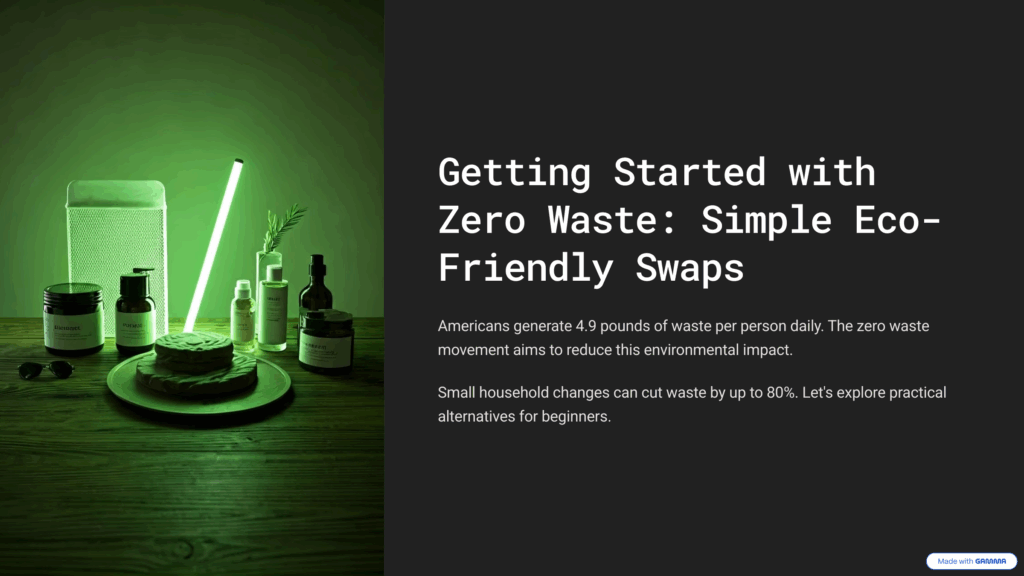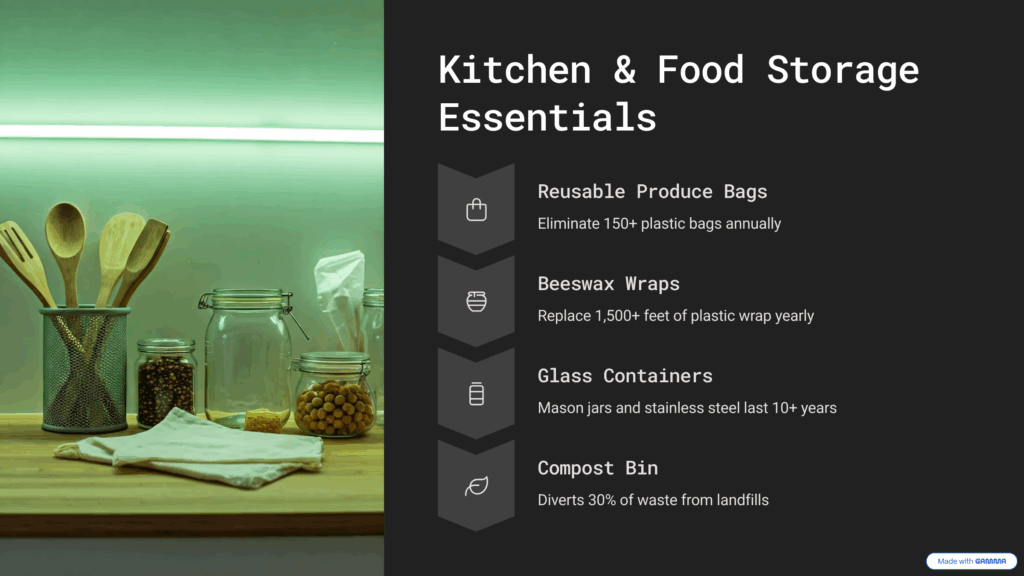[K-Bridge/Jay Son] Adopting a zero waste lifestyle is a meaningful step towards sustainability, emphasizing the reduction of waste and the conscious use of resources.
This approach encourages individuals to minimize their environmental footprint by using products that are reusable, recyclable, or compostable.
It promotes a shift from a linear consumption model to a circular economy, where materials are kept in use for as long as possible.
By incorporating eco-friendly products into daily life, individuals can significantly contribute to waste reduction and environmental preservation.
In this article, we will explore easy eco-friendly products to start with for a zero waste lifestyle, so if you are curious about how to begin your journey towards sustainability, keep reading.
Reusable Shopping Bags: A Simple Step Towards a Zero Waste Lifestyle
Benefits of Reusable Shopping Bags
Using reusable shopping bags is one of the simplest ways to reduce plastic waste.

These bags are typically made from durable materials, allowing them to withstand multiple uses without tearing or degrading.
Unlike single-use plastic bags, which contribute significantly to environmental pollution, reusable bags can be used for years, making them a cost-effective choice in the long run.
Additionally, many stores offer discounts or incentives for customers who bring their bags, further encouraging sustainable shopping habits.
Choosing the Right Material

When selecting reusable shopping bags, it’s essential to consider the material.
Cotton, jute, and recycled polyester are popular options, each with its own environmental impact.
Cotton bags, while biodegradable, require significant water and energy to produce.
Jute bags are more sustainable due to their low environmental footprint, but they may not be as durable as synthetic options.
Recycled polyester bags, on the other hand, help divert plastic waste from landfills but are not biodegradable.
Assessing your needs and preferences will help you choose the best option for your lifestyle.
Incorporating Bags into Daily Life
To truly embrace a zero waste lifestyle, it’s crucial to incorporate reusable shopping bags into your daily routine.
Keeping a bag in your car, purse, or backpack ensures you always have one on hand when needed.
Setting reminders on your phone or placing a note near your door can help you remember to take your bags when heading out.
By making this small adjustment, you contribute to reducing plastic waste and encourage others to follow suit.
Reusable Water Bottles: Hydration with a Purpose

Environmental Impact of Single-Use Bottles
Single-use plastic water bottles are a significant contributor to global plastic pollution.
Millions are discarded every year, taking hundreds of years to decompose.
By switching to a reusable water bottle, you can drastically reduce your plastic consumption and promote a cleaner environment.
Opting for stainless steel or glass bottles not only minimizes waste but also keeps your beverages at the desired temperature longer.
Choosing the Right Bottle
When selecting a reusable water bottle, consider factors such as size, material, and design.
Stainless steel bottles are durable and resistant to rust, while glass bottles offer a clean taste and are easily recyclable.
Additionally, look for bottles with insulation features to keep drinks cold or hot for extended periods.
A well-chosen bottle can enhance your hydration experience while supporting your zero waste lifestyle.
Making Hydration a Habit
To fully benefit from a reusable water bottle, it’s essential to make hydration a daily habit.
Fill your bottle each morning and carry it with you throughout the day.
Keeping it visible in your workspace or car can serve as a constant reminder to drink water.
By prioritizing hydration and reducing single-use plastic, you contribute to a healthier lifestyle and a cleaner planet.
Beeswax Wraps: A Sustainable Alternative to Plastic Wrap
Benefits of Beeswax Wraps
Beeswax wraps are an excellent alternative to plastic wrap, offering a sustainable way to store food.
Made from organic cotton infused with beeswax, these wraps are reusable, biodegradable, and compostable.
They help keep food fresh without the harmful chemicals found in plastic, making them a healthier option for both you and the environment.
By using beeswax wraps, you can significantly reduce your reliance on single-use plastics in the kitchen.
How to Use Beeswax Wraps
Using beeswax wraps is simple and versatile.
They can be molded around various food items, such as fruits, vegetables, sandwiches, and even bowls.
To use, simply warm the wrap with your hands to soften it, then shape it around the food or container.
Once finished, rinse the wrap with cold water and mild soap, allowing it to dry for reuse.
With proper care, beeswax wraps can last for up to a year, making them a cost-effective solution for reducing waste.
Cleaning and Maintaining Beeswax Wraps
To maintain the longevity of your beeswax wraps, avoid using hot water or harsh detergents during cleaning.
Instead, opt for cold water and gentle soap to preserve the beeswax coating.
Store the wraps in a cool, dry place to prevent them from becoming too soft or sticky.
By following these simple steps, you can ensure your beeswax wraps remain effective and sustainable for all your food storage needs.
Cloth Napkins: Elevating Dining with Sustainability
Advantages of Using Cloth Napkins
Switching from disposable paper napkins to cloth napkins is a small yet impactful change towards a zero waste lifestyle.
Cloth napkins are reusable, reducing the amount of paper waste generated from single-use options.
They add a touch of elegance to any meal, whether it’s a casual dinner or a formal gathering.
Additionally, cloth napkins can be easily washed and reused, making them a cost-effective choice in the long run.
Choosing the Right Fabric
When selecting cloth napkins, consider the fabric type, color, and design.
Cotton is a popular choice due to its absorbency and durability, while linen offers a more luxurious feel.
Opt for darker colors or patterns to hide stains, making maintenance easier.
Choosing high-quality fabric ensures that your napkins will withstand repeated washing and maintain their appearance over time.
Incorporating Cloth Napkins into Daily Life
To make cloth napkins a regular part of your dining experience, keep a set readily available in your kitchen.
Designate a specific drawer or basket for easy access during meals.
Encourage family members to use cloth napkins instead of paper ones, reinforcing sustainable habits.
By making this shift, you contribute to reducing paper waste and enhance your dining experience with a touch of elegance.
Compostable Trash Bags: A Step Towards a Zero Waste Lifestyle
Understanding Compostable Trash Bags
Compostable trash bags are designed to break down into organic matter, reducing the amount of waste sent to landfills.
Unlike traditional plastic bags, which can take centuries to decompose, compostable bags are made from plant-based materials that decompose within months under the right conditions.
Using these bags is a practical way to manage waste while supporting a zero waste lifestyle.
Choosing Quality Compostable Bags
When selecting compostable trash bags, look for certifications such as ASTM D6400 or EN 13432, which ensure the bags meet specific compostability standards.
Consider the size and thickness of the bags based on your waste disposal needs.
Investing in high-quality compostable bags ensures they perform effectively while breaking down in composting facilities or home compost systems.
Integrating Composting into Daily Life
To fully benefit from compostable trash bags, it’s essential to incorporate composting into your waste management routine.
Set up a compost bin in your kitchen or yard to collect organic waste, such as fruit and vegetable scraps, coffee grounds, and yard waste.
By using compostable bags for non-recyclable items, you can minimize landfill waste and contribute to creating nutrient-rich compost for your garden.
Eco-Friendly Cleaning Products: A Cleaner Home and Planet
Benefits of Eco-Friendly Cleaning Products
Traditional cleaning products often contain harmful chemicals that can negatively impact both health and the environment.
By switching to eco-friendly cleaning products, you reduce exposure to toxins while promoting a healthier home.
Many eco-friendly options are made from natural ingredients, making them biodegradable and safe for the environment.
This shift not only benefits your family but also contributes to a zero waste lifestyle.
Choosing the Right Products
When selecting eco-friendly cleaning products, look for certifications such as Green Seal or EcoLogo, which indicate that the products meet specific environmental standards.
Consider making your own cleaning solutions using common household items like vinegar, baking soda, and essential oils.
This not only reduces packaging waste but also allows you to customize your cleaning products to suit your preferences and needs.
Incorporating Eco-Friendly Practices
To fully embrace eco-friendly cleaning, consider adopting practices that minimize waste.
Use reusable cleaning cloths instead of disposable paper towels, and refill cleaning product containers instead of purchasing new ones.
Establish a regular cleaning schedule to maintain a tidy home while reducing the need for excessive cleaning products.
By integrating these practices, you contribute to a cleaner home and a healthier planet.
Sustainable Personal Care Products: Caring for Yourself and the Earth
Importance of Sustainable Personal Care Products
Many personal care products contain harmful ingredients and excessive packaging that contribute to environmental degradation.
By choosing sustainable personal care products, you prioritize your health and the planet’s well-being.
Options such as bamboo toothbrushes, shampoo bars, and refillable deodorants are becoming increasingly popular, offering eco-friendly alternatives to traditional products.
Selecting the Right Products
When selecting sustainable personal care products, consider factors such as ingredients, packaging, and brand ethics.
Look for products that are free from harmful chemicals, cruelty-free, and packaged in recyclable or biodegradable materials.
Researching brands and their sustainability practices can help you make informed choices that align with your values and contribute to a zero waste lifestyle.
Incorporating Sustainable Practices
To fully benefit from sustainable personal care products, establish a routine that prioritizes eco-friendly options.
Replace one product at a time, gradually transitioning to more sustainable alternatives.
Encourage friends and family to join you in this journey, sharing tips and recommendations for eco-friendly products.
By making these changes, you contribute to a healthier lifestyle and a cleaner planet.
Frequently Asked Questions
What are the main benefits of a zero waste lifestyle?
The primary benefits of a zero waste lifestyle include reducing environmental pollution, conserving natural resources, and promoting sustainable practices.
By minimizing waste, individuals can contribute to a healthier planet and inspire others to adopt similar habits.
How can I start my journey towards a zero waste lifestyle?
To start your journey, begin by assessing your current waste habits and identifying areas for improvement.
Incorporate reusable products, reduce single-use items, and educate yourself about sustainable practices.
Gradually implement changes that align with your lifestyle and values.
Are eco-friendly products more expensive than traditional ones?
While some eco-friendly products may have a higher upfront cost, they often save money in the long run due to their durability and reusability.
Additionally, many sustainable options are becoming more affordable as demand increases, making it easier to transition to a zero waste lifestyle.
Can I compost in an apartment?
Yes, composting is possible in apartments through methods such as worm composting or using a compost bin designed for small spaces.
Many cities also offer community composting programs, allowing apartment dwellers to participate in sustainable waste management.
How can I encourage others to adopt a zero waste lifestyle?
To encourage others, lead by example and share your experiences.
Educate friends and family about the benefits of a zero waste lifestyle, and provide practical tips for making sustainable choices.
Engaging in community initiatives and discussions can also inspire others to join the movement.







